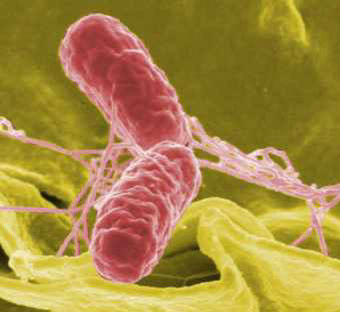Institute: University of Oxford
Typhoid vaccine-induced antibody glycosylation as a correlate of protection
Typhoid fever is caused by infection with Salmonella Typhi. It particularly affects regions of the world with inadequate water supply and poor sanitation, such as Africa and Southeast Asia. Children are at higher risk of developing typhoid fever and, although treatable by antibiotics, around 1 in 5 children who do not receive treatment die from the disease.

Image: Elapied at French Wikipedia https://commons.wikimedia.org/wiki/File:Salmonelle2d.jpg.
The Oxford Vaccine Group has helped develop two typhoid vaccines through human infection (challenge) studies. One of these, a vaccine called Vi-TT, was tested in larger trials in Nepal and it was effective at preventing many people from getting typhoid fever. The World Health Organisation (WHO) has recommended this vaccine for regions with high rates of Salmonella Typhi infections and areas where the bacteria have become resistant to antibiotic treatment.
However, the Vi-TT vaccine doesn’t protect everyone from the disease. Antibodies (part of the immune system) are an important way that vaccines protect people from diseases, but we didn’t find any difference in the overall antibody levels between people who were protected by the vaccine compared to those who weren’t.
In this project, we plan to take a closer look at the characteristics of the antibodies created in response to vaccination. We are studying the section of antibodies that bind to other immune cells, which can be modified by sugar molecules (glycans). Different arrangements of these sugar molecules result in a variety of immune reactions, and we hope to find a pattern that is linked to the Vi-TT vaccine being protective.
Understanding what makes the vaccine work could give us important clues to help improve the Vi-TT vaccine, or make new and more effective vaccines in future studies.

